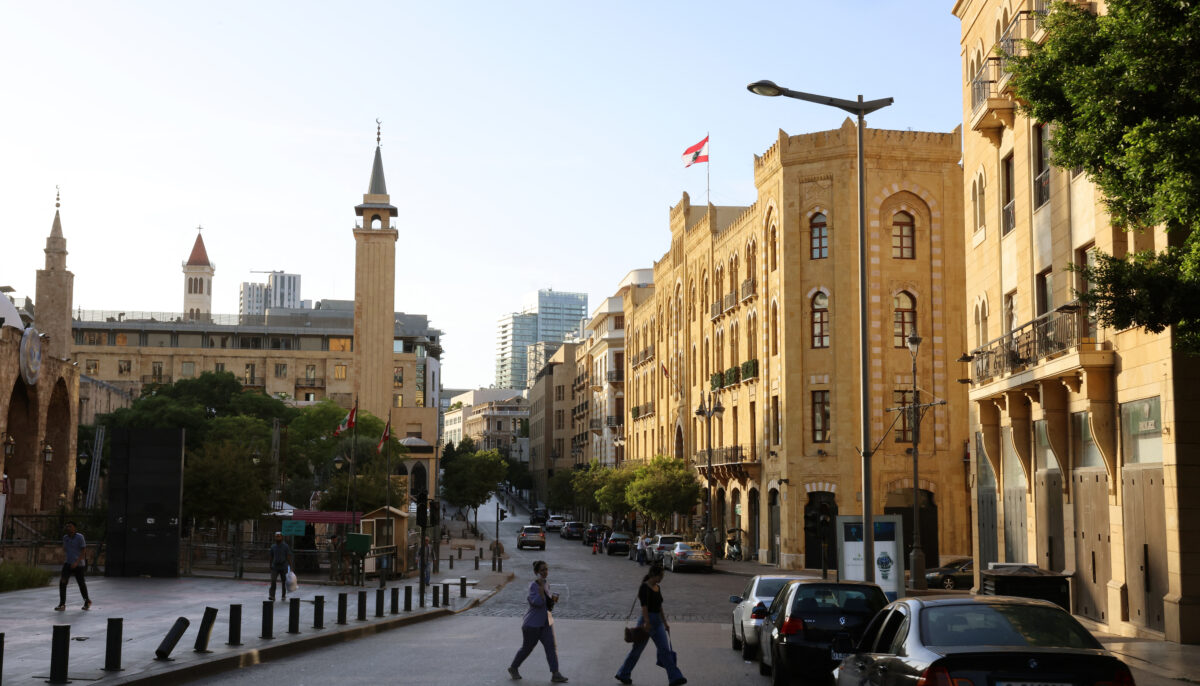A journalist in Lebanon was recently forced to hand her phone, password, messaging content, and information sources to the Information Department of the Public Prosecution Office at the Court of Cassation, sparking concerns over the deterioration of press freedom and the violation of privacy in the country.
The journalist denied any connection to the subject and refrained from commenting after SMEX contacted her. The lack of sufficient information about the case allowed media outlets to make assumptions and give unreliable information.
Some media outlets have published or leaked several cases, proving that local laws cannot sufficiently protect journalists and their sources, further risking the freedom of the press.
In 2024, Lebanon’s freedom of the press rating drastically dropped 21 ranks, reaching 140/180 worldwide on the 2024 World Press Freedom Index by Reporters Without Borders (RSF). The report stated that press freedom declined due to Lebanon’s worsening economic and political crisis and the increased restrictions on journalists.
Phone privacy: a sacred right
“In a country that has seen non-commitment to protecting the rights of defendants and countless violations by members of the judicial police, it is necessary that an attorney be present during investigations,” according to Diala Chehade, a lawyer and human rights activist.
Chehade asserted that phone privacy “is a right as sacred as the inviolability of the home, which means that the Lebanese Constitution and Penal Law safeguard this privacy.”
In theory, the law in Lebanon protects privacy, specifically regarding electronic devices and phones, yet authorities’ practice on the ground differs.
Although the Code of Criminal Procedure amended in 2001 gives judges the right to confiscate devices, and Law No. 140 allows certain branches of the executive authority to issue such orders, both legal texts stipulate conditions that should be adhered to, such as issuing confiscation orders in writing, with a valid justification, and in “extreme cases” only.
Chehade also explains that Law No. 81 on Electronic Transactions and Personal Data, adopted in 2018, transfers the authority to confiscate and inspect devices during investigations from the investigating judge to the Public Prosecution without any restrictions.
The judiciary has the right to access the phone during its investigations, but it cannot use physical or verbal force to compel the citizen to hand in the device.
If the judge deems the phone necessary for the investigation and issues a confiscation order, the phone owner has the right to refuse.
But in reality, what happens is that Public Prosecution judges threaten to arrest defendants for non-compliance and sometimes demand that phones be unlocked and offensive posts deleted under the threat of arrest.
Law No. 83 of 10/10/2018 regarding the Protection of Whistleblowers was issued as part of a set of laws to fight corruption in Lebanon. It defines the whistleblower as “any natural or legal person who provides information believed to be related to corruption regardless of capacity and interest.”
How the law fails to fight corruption
Lebanon has been classified as one of the most corrupt countries worldwide, ranking 149 out of 180 in the 2023 Corruption Perceptions Index released by Transparency International, a civil society organization monitoring corruption globally. So far, no law or measure has succeeded in fighting corruption.
“The problem is that the Law is tied to the National Anti-Corruption Commission, which is still awaiting signatures from the Ministry of Finance to allocate a small budget for it and provide it with employees from other ministries,” Chehade told SMEX.
“The Commission was established according to Law No. 175 of May 8, 2020, on Combating Corruption in the Public Sector and Establishing the National Anti-Corruption Commission, in line with the United Nations Convention Against Corruption of November 31, 2003.”
The Commission defines itself as “an independent administrative body, with a legal personality and financial and administrative independence, whose members enjoy broad-scale immunities.”
In reality, the Commission lacks resources, including personnel and funding. It faces numerous other technical challenges that make it partly dysfunctional, according to a report issued by Maharat Foundation, a Lebanese organization focused on freedom of opinion and expression.
Amid talks about violations, many journalists and activists now avoid bringing their phones to investigations.
Chehade further explains that “although the Whistleblower Protection Law provides judicial and security protection, it can only be activated and enforced upon presenting an explicit disclosure to the National Commission, which means that journalists can only benefit from it if it is fully activated.”
As for the protection of journalists’ sources, the lawyer clarified that the amended Publications Law does not include any provision to protect journalist sources. Maharat supported the development of a new media law that protects journalists’ sources, workplaces, and electronic devices.
Chehade pointed out that someone can be forced to hand in their phone only to verify an event, incident, or fact.
In such cases, the judge may ask the journalist about their sources, especially if they are documents that cannot be leaked legally, such as investigation reports.
In other cases, journalists may refuse to disclose their sources, knowing that refraining may lead to legal action against them.
In this case, a subpoena can potentially be issued against them, but as in documented cases, it automatically expires after one month.
Understanding Lebanon’s “Civil Prosecution” system
Journalists in Lebanon have been illegally mistreated and summoned to military or criminal courts instead of the Publications Court, the judicial site legally responsible for prosecuting them.
For example, on May 24, 2023, activist Hayat Mirshad was summoned before the Cybercrime and Intellectual Property Protection Bureau after Film Director Joe Kodeih filed a defamation lawsuit against her.
On September 6, 2023, Journalist Mariam Majdouline Laham was summoned for investigation at the Central Department of Criminal Investigations because of a post about corruption in religious institutions.
During the investigation conducted by judicial and security agencies, Majdouline was subjected to a series of violations. A security officer forcefully snatched her house keys from her hand, accessed her laptop and Facebook account, and deleted her post without her consent.
Tony Mikhael, a legal expert at Maharat, told SMEX that the civil prosecution system does not include custodial sentences (i.e., prison terms or penal fines) that could lead to imprisonment or tarnish a person’s criminal record.
According to Mikhael, the civil prosecution system is based on civil responsibility. Judges can order financial compensation for damage caused by civil mistakes.
The litigation period in civil lawsuits is longer. This is considered one of the system’s caveats since longer trials further exhaust the defendant.
If a journalist is found guilty of defamation and causing serious harm to one or more people, they may be ordered to pay a hefty compensation and have their property and/or home seized.
Mikhael stressed the need to provide journalists with legal guarantees, such as setting a ceiling for financial compensation and requiring the media outlet to bear due financial compensation.
Furthermore, the civil system does not allow for summons before investigation bureaus and police stations, arbitrary arrests, and pre-trial detention, and there should be no role for the Public Prosecution and investigation judges.
Methods of proof differ between civil and penal cases, as civil lawsuits do not demand phone confiscation or other similar forms of evidence. This gives journalists more freedom and better protection of their privacy and personal information.
Mikhael believes that “media institutions must develop clear policies to protect confidential information and privacy within their institutions, and they must train their employees on them.”
According to him, such a plan requires specialized training courses in digital security and data protection for journalists, safe programs and applications for electronic communications and data storage, and the commitment of media institutions to offering legal and psychological support to journalists facing violations and harassment related to their work.
Mikhael also provided general recommendations for journalists on protecting their privacy and the confidentiality of their information. For example, journalists should handle confidential files, information, and documents with caution, storing them in password-protected safe places and using encrypted applications and programs for electronic communication and messages.
Preventive protection of data as a necessary measure
Journalists need legal protection, but ensuring the technical security of their data has also become equally important.
The Digital Security Helpdesk Manager at SMEX, Samar Al-Halal, recommends that journalists use a different phone when summoned for investigation or in other cases that threaten their privacy.
Al-Halal also advises saving private information on devices other than their personal phones, such as laptops, and backing up this information in case the phone gets confiscated. This facilitates data retrieval after purchasing a new phone.
SMEX plays a crucial role in assisting journalists whose phones have been confiscated. Our team runs a security check to ensure no tracking apps or suspicious updates were installed.
SMEX continues to provide these essential services via the Digital Safety Helpdesk, supporting journalists facing digital privacy and security violations.
Al-Halal also expressed losing faith in tech giants’ role in protecting journalists’ privacy, as they often prioritize profit over the latter.
When a government requests user data access, companies often respond favorably. She strongly advises using messaging applications such as Signal, a non-profit application that safeguards user privacy.
Signal is known for its various protection tools, such as the Disappearing Messages feature or the newly added feature that allows users to exchange messages through a username without revealing their actual name or phone number.
Signal also refrains from collecting user metadata, including details such as the other party’s identity in a conversation, conversation date, frequency, and type (text or voice).
Metadata often plays a significant role in revealing compromising information about users. Given the corruption, numerous violations, and escalating harassment against journalists in the country, safeguarding the principles of press freedom and privacy protection remains crucial to ensure an independent and free flow of information.
Journalists’ freedom can only be assured through the enactment and strict enforcement of laws that support journalists and safeguard their data, both in theory and in practice.



